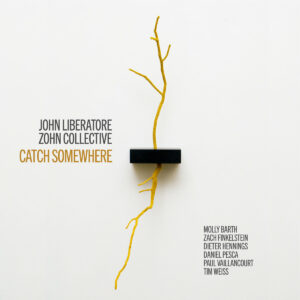John Liberatore – Catch Somewhere (CD Review)
John Liberatore
Catch Somewhere
Zohn Collective – Molly Barth, flute; Andrew Nogal, oboe; Sammy Lesnick, clarinet; Paul Vaillancourt, percussion; Dieter Hennings, guitar; Daniel Pesca, piano/harpsichord; Hann Hurwitz, violin; Dominic Johnson, viola; Colin Stokes, cello; Robert Simon, bassoon; Ryan Berndt, trumpet; Brant Blackard, percussion, Nöel Wan, harp; Brendan Shea, violin; Philip Serna, contrabass; Zach Finkelstein, tenor; Tim Weiss, conductor
New Focus Recordings
Composer John Liberatore teaches at Notre Dame, and has traveled widely through the benefit of various fellowships, including those from MacDowell, Millay, Tanglewood, Yaddo, the Brush Creek Arts Foundation, and a Presser Music Award to study in Tokyo with Joe Kondo. His music has traveled widely too, with many contemporary ensembles commissioning and performing it. As a performer himself, John Liberatore has revived an old and esoteric instrument, the glass harmonica.
Catch Somewhere, a portrait CD of Liberatore’s chamber works on New Focus, is well performed throughout by the Zohn Collective, a sinfonietta-sized ensemble containing some of the most prominent contemporary performers in the United States. Various subsections of the group are utilized in the programmed selections.
The recording opens with “A Very Star-Like Start,” a capriccio for eight instruments that demonstrates well Liberatore’s general approach: rhythmically vibrant with frequent ostinatos, and a chromatic pitch language that at times hews close to tonality and then veers towards shadowy post-tonal sections. “A Very Star-Like Start” is an excellent curtain-raiser, with compound melodies built between strings, winds, and percussion that then unfold into fleet ostinatos and angular lines.
Flutist Molly Barth plays “Gilded Tree,” a four-movement solo piece with titles from the poetry cycle “Fable” by Randall Potts. Here as elsewhere, there is a poetic impulse that operates alongside the musical one in Liberatore’s creative approach. Even in instrumental pieces, the resonances found in word groupings provides a generative role. Barth plays in a number of demeanors: slow delicacy in “dark inside secure,” punctilious rapid passages in “black twig lips,” mysterious lyricism moving to brash high notes in “silence lost to echoes,” and liquid trills paired with repeated melodic cells in “quivering with light.” Barth’s dynamic control and virtuosity are most impressive.
The title work is an eight-movement suite for guitar, prepared piano, and percussion, which alternate prominence in the various movements. Once again, a poem, Walt Whitman’s “A Noiseless Patient Spider,” which Liberatore found while at MacDowell Colony, serves as inspiration. “Catch Somewhere” includes particularly beautiful writing for prepared piano, not at all Cagean but entirely its own preparation. In the first movement, “vacant, vast, surrounding,” motives, many timbral, that will be used throughout are introduced. Pianist Daniel Pesca plays a beautiful cadenza in the second movement “surrounded, detached,” which then becomes a soft duet with guitarist Dieter Hennings. Hennings continues with a cadenza of his own, featuring snapped pizzicato, in the third movement “little promontory.” This too is succeeded by a duet, this time with percussionist Paul Vanillancourt, whose motifs are responses to the guitar’s riffs. The movement then erupts, with piano, unpitched percussion, and guitar playing thick passages fortissimo. Repeated notes from the piano initially signal a dialing back, but the trio continues in vigorous fashion to its close.
“thread 1” returns to mallet instruments and guitar harmonics, creating a brief, undulating groove. The longest movement, at six minutes, “O my soul,” begins with an arpeggiated guitar solo with rich tone from Pesca. Mallet instruments are featured in the next solo, gradually shadowed by the other instruments. The guitar’s cadenza then returns with gongs providing resonance behind it in a hushed close. “thread 2” is another brief piece for mallet instruments, once again with guitar harmonics joining, this time at the close. “filament, filament, filament” opens riotously, then juxtaposes various instrumental deployments in a brisk moto perpetuo, dissipating at its conclusion. The piece’s final movement “catch somewhere” features bright harmonies and repeated notes, particularly prominent in unpitched percussion. A strong, arcing melody presses the music forward towards its conclusion. Repeated patterns then succeed this, with thunderous repeated bass notes from the piano juxtaposed against gentle guitar lines. A denouement ensues, in a decrescendo to niente. “Catch Somewhere” is a well-crafted, engaging, and entertaining piece.
The only piece that includes a singer is the CD’s final one, Hold Back Thy Hours, a setting of fragments of seventeenth century English poetry. Tenor Zach Finkelstein performs the four songs that comprise the set with precision and expressivity, his high notes suffused with easy lightness and his phrasing thoughtfully unpacking the aphoristic texts. The ensemble accompanies him with a complex thicket of pitch slides and knotty tunes, out of which offset attacks provide a sense of surprise that supports the nonlinearity of the textual fragments. My favorite among these is perhaps the most traditional, “violets pluck’d,” which includes a lamento bass. Its imaginative scoring, however, is fully of the present.
Liberatore’s Catch Somewhere is one of my favorite recordings thus far in 2023. Highly recommended.
-Christian Carey
